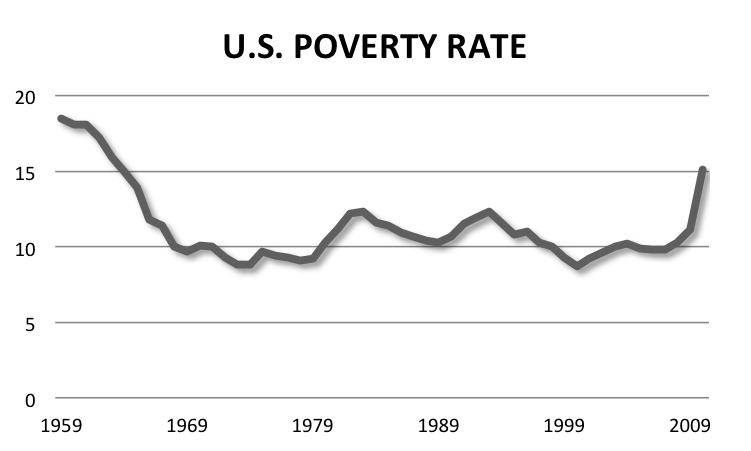
After 50 years and trillions of dollars, the war on poverty cost Americans something far more valuable than money. Though there is no metric or measurement to rival this soon-to-be lost American treasure, it is worth offering various tidbits of data from some of the many attempts to calculate the total war on poverty cost.
Because President Obama and the Democratic Party have decided to stake their political survival in the 2014 midterm election on a class warfare message underscoring income inequality, you’d think it would be self-evident that the war on poverty has been a total failure. But alas, many are still convinced government has been effective at “leveling” the economic playing field in the past, thus will be in the future.
In 2011 alone, federal, state and local government expenditures on all 126 government assistance programs totaled in excess of $952 billion, but poverty did not decrease. In fact, let’s take a quick look at the poverty rate graph below, depicting the U.S. poverty rate from 1959 to 2011.

When we look at the traditional standard measurement for the poverty rate, several conclusions immediately jump out of the graph. Consequentially, the Obama administration plans to soon change to relative measurements for the poverty rate, a tactic used by all socialist regimes in Europe, Asia and Latin America. It fits in nicely with their false income inequality deception, but it is false, nonetheless.
First, before the war on poverty the actual poverty rate was plummeting, despite the absence of “Great Society” government assistance. Second, there are only two appreciable decreases in the poverty rate relative to the decade prior.
Much to the dismay of liberal progressives, during the period from 1983 to 1989 — when President Reagan actually cut taxes, deregulated, and decreased government spending as a percentage of GDP — the poverty rate declined to 12.8 percent, reversing much of the 33 percent increase in the poverty rate resulting from the big government policies of President Carter.
The second appreciable decrease occurred under President Clinton, who unequivocally benefited from the economy Reagan largely shaped, the tech boom, and an over-inflated housing market brought about by the very same big government policies — i.e. the Community Reinvestment Act — which would tank the economy and lead to the highest poverty rate since the war on poverty began.
Worth noting, under President Obama, Mr. Class Warfare, income for the top 1 percent increased by 31.4 percent, while the bottom 99 percent saw their incomes grow by just .4 percent.
So, why has the poverty rate remained relatively flat all of these years if people like Mr. Class Warfare are spending government money on the war on poverty?
Since the adoption of the “Great Society” that granted big government the moral authority to smother civil society with initiatives such as the war on poverty, our national identity realized an appreciable decrease in the quantity of that aforementioned American treasure; our unique Protestant work ethic and its religious and moral characteristics that kept families and communities what Tocqueville described as the bulwark of American success, prosperity and freedom.
I have written extensively on the societal impact the unique Protestant ethic has had, as well as its role in forming the American national identity, for years. Most notably, in Our Virtuous Republic, I identified seemingly insignificant characteristics that are largely unknown to most everyday Americans, yet are extraordinarily important and influential in our everyday lives, as well as the foundational tenets of our traditional American philosophy.
These traits are behind our success and prosperity, and despite what progressives contend, they did truly make us exceptional, including the “calling” to labor, our traditional family values and personal responsibility, all are virtues and characteristics big government programs provide us with incentives to ignore.
When Lyndon B. Johnson declared an “unconditional war on poverty in America” on January 8, 1964, a full 93 percent of children born in the United States were born to married parents. If the divorce rate in the U.S. today was the same as the 1970s, just before big government subsidizing idleness and irresponsibility began negatively impacting society, the impact alone would decrease the poverty rate by 25 percent.
Big government progressives love to scream about education and other secondary causes of poverty, but no child can receive a proper education unless brought up in a home — not a “household” — that is conducive to a child’s learning.
Or, put another way, a child of a single-parent household with a government-subsidized first class education is still not statistically likely to achieve long-term upward mobility for themselves or their future family, because government doesn’t inspire us to accept delayed gratification, or other character-building traits necessary for citizens to possess in order to build a healthy, empowering civil society.
Only when our families and communities are together strong can we meet our own and each other’s hierarchy of needs, and it starts with providing our children with a stable, disciplined, conducive environment for intellectual and moral growth.
Whether one day we will ever be rid of the secular progressive falsehood denying our nation’s unique, American Protestant identity spawned along with our founding principles, is irrelevant. The nation’s move away from our unique work ethic, toward a reliance and dependence on this big government nanny state, has had self-evident consequences.
“Idle hands do the devil’s work,” once wrote a certain Benjamin Franklin at a later point in his life (sarcasm emphasized).
Conservatives have failed to combat the progressive message that factitiously harps on poverty and income inequality, because too many either do not understand or perhaps they do not even know how to articulate the real issue, which is that “the real danger posed to Americans from big government is its strong, innate ability to destroy the human connection.” Statistics are facts in numbers, but they are also people.
So, when you hear pundits opine on the 50-year anniversary of the war on poverty, remember there is no metric or measurement to rival our real spent national treasure, a treasure with tangible value that transcends the mere monetary value they will use to calculate the war on poverty cost to what was once, and I pray will again be, our virtuous republic.







